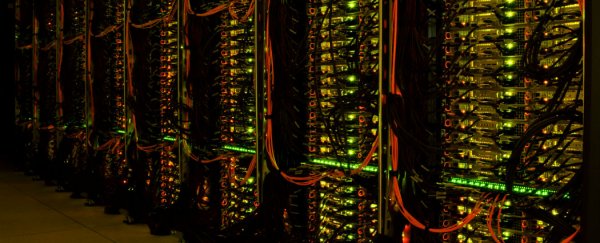While we can't completely dismiss the idea of an AI-driven robot revolution in the distant future, a new study has found that even today's most advanced supercomputers are only one-thirtieth as powerful as the human brain, so we should be able to out-think the robots we're sharing our lives with for some time yet.
Two PhD students in the US figured this out using a measurement called traversed edges per second (or TEPS) to measure computational capability - it's essentially how quickly a computer can shift information from one point to another within its own system. There's no exact equivalent in the human brain (or at least not one that can be measured), so they used a rough estimate of how frequently neurons in the brain fire off electrical signals.
"A big pragmatic benefit of measuring the brain in terms of communication is that it hadn't been done before," Katja Grace from the University of California, Berkeley told IEEE Spectrum. "[This method] provides a relatively independent estimate of the price of computing hardware roughly comparable to the brain."
Grace and her colleague Paul Christiano from Carnegie Mellon University used the IBM Sequoia supercomputer as the artificial intelligence champion: the machine currently holds the TEPS benchmark record with 2.3 x 1013 TEPS of power at its disposal. Their calculations suggest that the brain is at least as agile and possibly up to 30 times faster than Sequoia at shifting data around. Based on current market prices, that means you stand to earn between $4,700 and $170,000 if you rented out your brain's computing power for an hour.
The pair have estimated that cheap computer rigs (costing in the region of $100 an hour) could catch up with the brain's processing power in seven to 14 years, though there are a lot of speculative assumptions built into that prediction, and even then, the software to utilise that power will need to be written by humans. One of the big unknowns right now is just how quickly TEPS performance is going to increase in supercomputers.
"We have very little idea how efficiently the brain uses its computational resources, and how that will compare to the efficiency of systems that humans design," says Grace. "So even if we knew how much hardware was needed to do what the brain is doing in the way the brain is doing it, this might be very different from the amount of hardware human engineers need to achieve the same functions once they have any way to achieve those functions."
At this early stage, it looks like we have the upper hand - at least until the next supercomputer comes along.
The research was carried out as part of the AI Impacts project, which as well as comparing robotic intelligence with human intelligence, is also looking at how software might advance in the years to come: slow, incremental steps or large jumps. This summer, the project received US$49,310 in funding from Boston's Future Of Life Institute, itself a beneficiary of some US$7 million donated by SpaceX and Tesla Motors CEO Elon Musk to examine the potential implications of advanced AI development.
